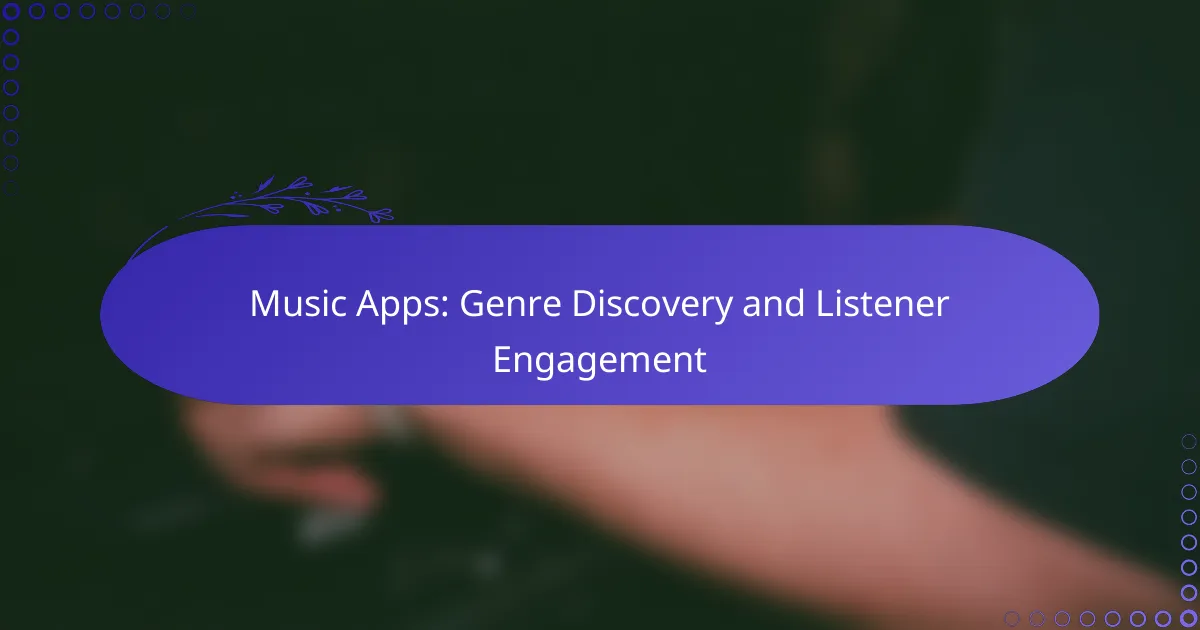Music apps have revolutionized genre discovery by providing personalized experiences that connect users with new styles and artists tailored to their listening habits. By leveraging algorithms and user preferences, these platforms offer curated playlists and recommendations, making it easier for listeners to explore diverse musical landscapes. Additionally, interactive features and community engagement enhance the overall experience, fostering a vibrant environment for music lovers.

How can music apps enhance genre discovery?
Music apps enhance genre discovery by offering tailored experiences that introduce users to new styles and artists based on their listening habits. These features help users explore diverse genres, making it easier to find music that resonates with their tastes.
Personalized playlists
Personalized playlists are collections of songs curated specifically for an individual based on their listening history and preferences. Apps like Spotify and Apple Music analyze user behavior to create playlists that reflect current favorites and suggest new tracks within similar genres.
To maximize the effectiveness of personalized playlists, users should regularly engage with the app by liking or disliking tracks. This feedback helps the algorithm refine future recommendations, ensuring a more satisfying listening experience.
Algorithmic recommendations
Algorithmic recommendations utilize complex algorithms to suggest music based on user interactions, such as song skips, repeats, and playlist additions. These systems often consider various factors, including genre, tempo, and mood, to provide relevant suggestions.
Users can benefit from exploring the “Discover Weekly” or “For You” sections in their music apps, which often feature a mix of popular tracks and hidden gems tailored to their tastes. Regularly updating preferences can enhance the accuracy of these recommendations.
Curated genre stations
Curated genre stations are dedicated streams that focus on specific music styles, offering a continuous flow of tracks within a chosen genre. These stations are often managed by music experts or algorithms that ensure a cohesive listening experience.
Listeners can explore various genre stations to discover both classic and contemporary artists. Engaging with these stations can lead to a deeper appreciation of different styles and help users find new favorites they might not encounter otherwise.
Social sharing features
Social sharing features allow users to share their favorite tracks, playlists, and listening habits with friends and followers. This functionality not only fosters community engagement but also exposes users to music their peers enjoy, broadening their genre discovery.
To take advantage of social sharing, users should connect their accounts to social media platforms and participate in discussions about music. This interaction can lead to discovering new genres and artists through recommendations from friends and influencers.
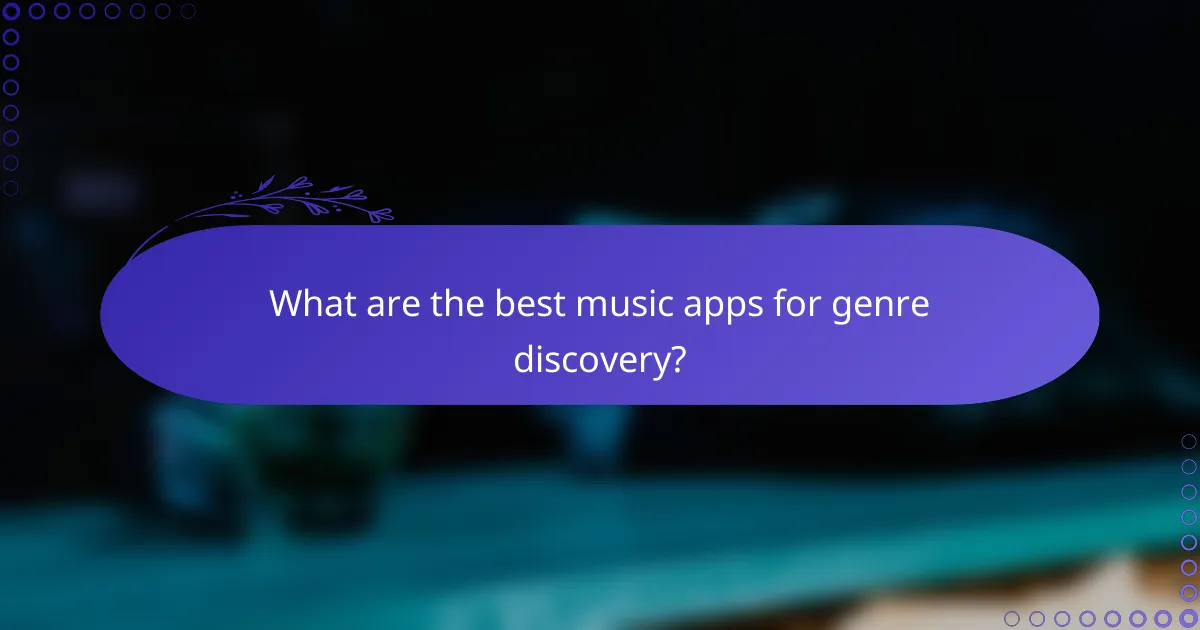
What are the best music apps for genre discovery?
The best music apps for genre discovery offer personalized recommendations, curated playlists, and tools to explore various music styles. These platforms utilize algorithms and user preferences to help listeners find new genres and artists that match their tastes.
Spotify
Spotify excels in genre discovery with its extensive library and personalized playlists like Discover Weekly and Release Radar. These features analyze your listening habits to suggest new tracks and artists tailored to your preferences.
Users can explore genre-specific playlists and radio stations, making it easy to dive into different styles. Spotify also allows you to follow friends and see what they are listening to, enhancing the discovery experience through social engagement.
Apple Music
Apple Music offers a robust genre discovery experience through curated playlists and expert recommendations. The For You section provides personalized suggestions based on your listening history, helping you uncover new genres and artists.
Additionally, Apple Music features a wide array of radio stations, including genre-based options, which can introduce you to new music. The integration with Siri allows for hands-free genre exploration, making it convenient to discover music while multitasking.
Deezer
Deezer stands out with its Flow feature, which creates a personalized soundtrack based on your tastes and listening habits. This feature combines your favorite tracks with new recommendations, making it easy to explore different genres.
Deezer also offers a vast collection of playlists across various genres, allowing users to dive deep into specific styles. The app’s editorial content, including articles and interviews, provides context and background on different genres and artists.
Tidal
Tidal focuses on high-fidelity sound quality and exclusive content, which enhances the genre discovery experience. The platform features curated playlists and recommendations that highlight new and trending music across various genres.
With its emphasis on artist ownership, Tidal often showcases emerging artists and niche genres, providing a unique perspective on music discovery. Users can explore genre-specific playlists and enjoy high-quality audio, making it appealing for audiophiles looking to discover new sounds.
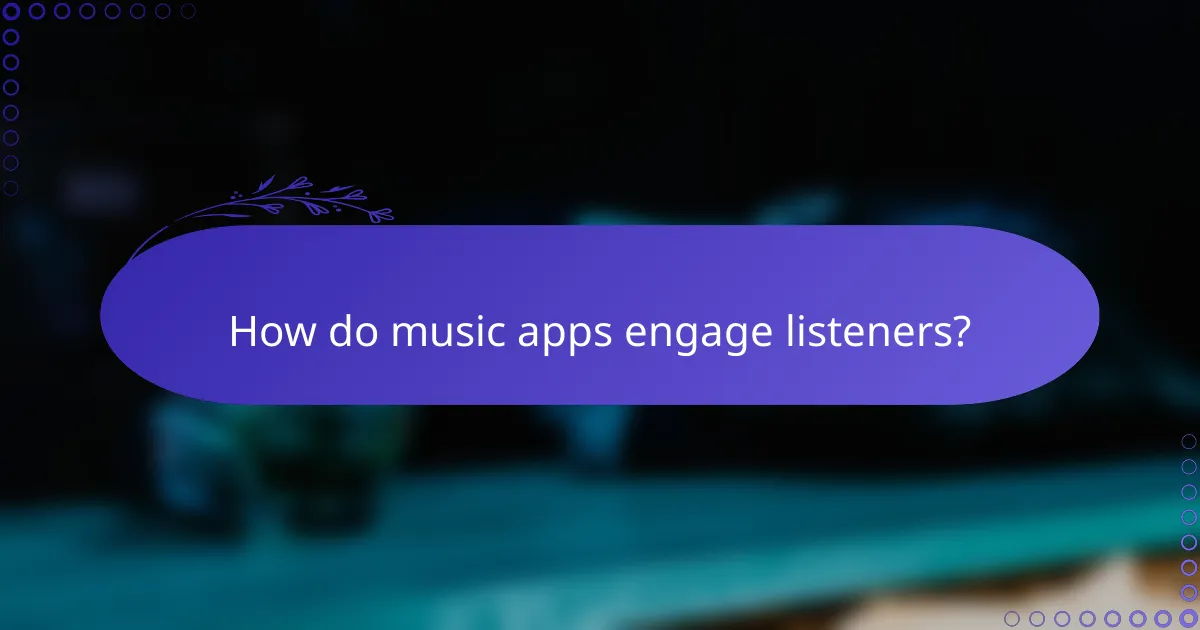
How do music apps engage listeners?
Music apps engage listeners through a variety of interactive features, live events, user-generated content, and community forums. These elements create a dynamic environment that fosters connection and enhances the overall listening experience.
Interactive features
Interactive features in music apps, such as playlists, song recommendations, and personalized radio stations, allow users to tailor their listening experience. For example, algorithms analyze listening habits to suggest new tracks or artists, making discovery seamless and enjoyable.
Additionally, features like polls, quizzes, and gamification elements encourage user participation and create a sense of involvement. Users can earn rewards or badges for their activity, further enhancing engagement.
Live streaming events
Live streaming events, including concerts and Q&A sessions with artists, provide unique experiences that traditional music consumption does not offer. These events allow listeners to connect with their favorite musicians in real-time, often including interactive elements like live chats.
Many apps host exclusive live performances that can be accessed for free or through a subscription, making it an attractive option for fans. The immediacy of live events can significantly boost user engagement and create a sense of community among listeners.
User-generated content
User-generated content, such as playlists and reviews, plays a crucial role in music apps by allowing users to share their tastes and discoveries. This content not only enriches the app’s offerings but also fosters a sense of ownership and community among users.
Encouraging users to create and share their playlists can lead to increased engagement, as friends and followers can discover new music through each other’s recommendations. Apps that facilitate this sharing often see higher retention rates and user satisfaction.
Community forums
Community forums within music apps provide a platform for users to discuss their favorite genres, artists, and trends. These forums can enhance listener engagement by creating a space for fans to connect, share opinions, and discover new music together.
Active participation in forums can lead to a more vibrant user experience, as members exchange ideas and recommendations. Apps that support robust community interactions often see increased loyalty and user retention, as listeners feel more connected to the app and its user base.
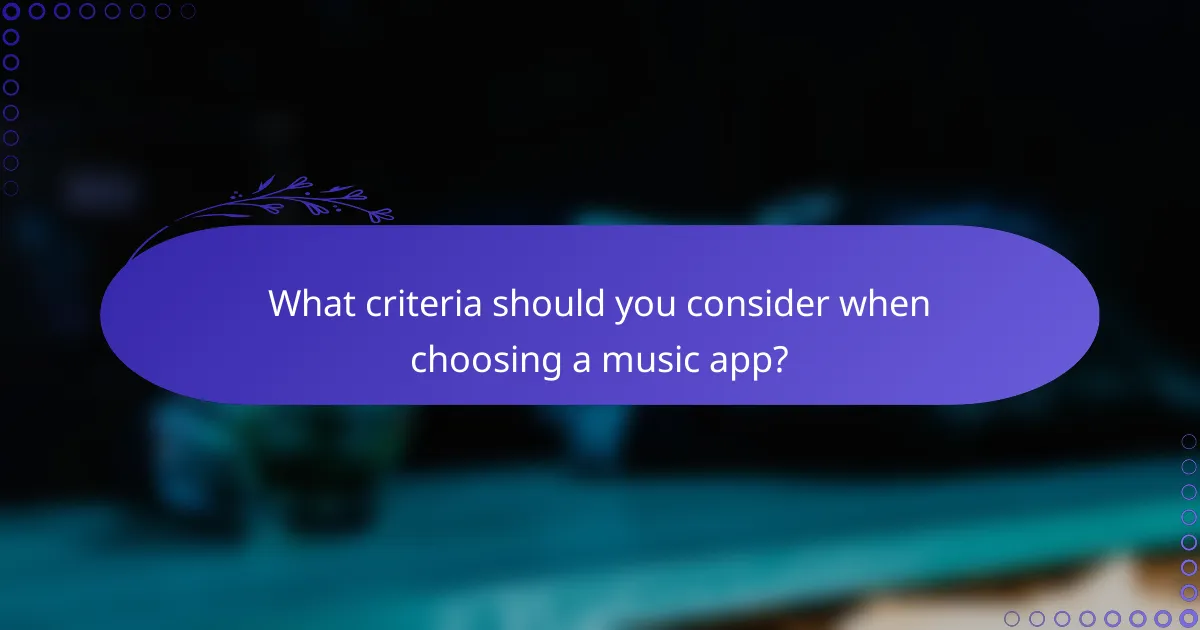
What criteria should you consider when choosing a music app?
When selecting a music app, consider factors such as the size of the music library, subscription costs, user interface design, and device compatibility. These elements significantly impact your overall experience and satisfaction with the app.
Music library size
The size of a music library is crucial as it determines the variety of songs and genres available to you. Look for apps that offer millions of tracks, including popular hits and niche selections. A larger library often means more opportunities for discovering new music and artists.
Additionally, consider whether the app includes exclusive content, such as live recordings or artist interviews, which can enhance your listening experience. Some apps may also provide curated playlists that reflect current trends or specific moods.
Subscription costs
Subscription costs vary widely among music apps, typically ranging from a few dollars to around twenty per month. Evaluate your budget and what features are included in each pricing tier, such as ad-free listening, offline downloads, or family plans.
Many apps offer free trials or discounted rates for students, so take advantage of these options to test the service before committing. Be mindful of any hidden fees or automatic renewals that could affect your overall spending.
User interface design
A user-friendly interface can significantly enhance your music app experience. Look for apps that prioritize intuitive navigation, allowing you to easily search for songs, create playlists, and access features without confusion.
Consider the visual appeal as well; a clean, attractive design can make your music discovery more enjoyable. Read reviews or try demos to see how the interface feels in practice, as this can vary greatly between different apps.
Device compatibility
Ensure that the music app you choose is compatible with your devices, whether they are smartphones, tablets, or desktop computers. Most apps support major platforms like iOS and Android, but check for any limitations on older devices or operating systems.
Additionally, consider if the app integrates with other devices, such as smart speakers or wearables, which can enhance your listening experience. Compatibility with various streaming services or social media platforms can also be a plus for sharing your favorite tracks.
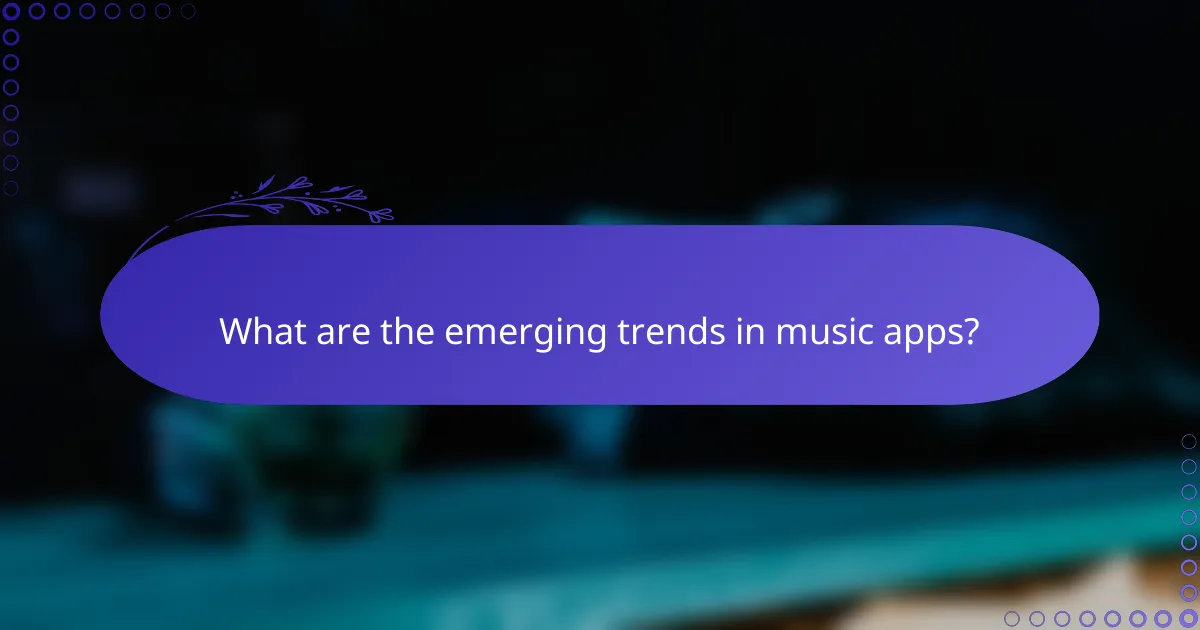
What are the emerging trends in music apps?
Emerging trends in music apps focus on enhancing user experience through innovative technologies and features. Key developments include AI-driven personalization, social integration, and immersive audio experiences that cater to diverse listener preferences.
AI-driven personalization
AI-driven personalization in music apps tailors recommendations and playlists based on individual listening habits and preferences. By analyzing user data such as song choices, skip rates, and time spent on tracks, these apps create a unique listening experience for each user.
For example, platforms like Spotify and Apple Music utilize algorithms that adapt to user behavior, offering curated playlists that evolve over time. This personalization can significantly enhance user engagement, as listeners are more likely to discover new music that aligns with their tastes.
To maximize the benefits of AI-driven personalization, users should regularly update their preferences and engage with the app’s features, such as liking or disliking songs. Avoid relying solely on default playlists, as actively participating in the app’s ecosystem can lead to more accurate recommendations.
